HMAS Choules
HMAS Choules (L100) is a Bay-class landing ship that served with the Royal Fleet Auxiliary (RFA) from 2006 to 2011, before being purchased by the Royal Australian Navy (RAN). The vessel was built as RFA Largs Bay by Swan Hunter in Wallsend, Tyne and Wear. She was named after Largs Bay in Ayrshire, Scotland, and entered service in November 2006. During her career with the RFA, Largs Bay served as the British ship assigned to patrol the Falkland Islands in 2008, and delivered relief supplies following the 2010 Haiti earthquake.
HMAS Choules at Fleet Base East Sydney Harbour, Australia in August 2014 | |
| History | |
|---|---|
| Name: | Largs Bay |
| Namesake: | Largs Bay |
| Ordered: | 18 December 2000 |
| Builder: | Swan Hunter, Wallsend, Tyne and Wear |
| Laid down: | 28 January 2002 |
| Launched: | 18 July 2003 |
| In service: | 28 November 2006 |
| Out of service: | April 2011 |
| Identification: |
|
| Fate: | Decommissioned under SDSR, sold to Australia |
| Name: | Choules |
| Namesake: | Chief Petty Officer Claude Choules |
| Acquired: | 6 April 2011 |
| Commissioned: | 13 December 2011 |
| Homeport: | Fleet Base East |
| Identification: |
|
| Motto: | "Face Difficulty With Zeal" |
| Status: | Active as of 2019 |
| Badge: |
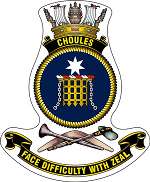 |
| General characteristics | |
| Class and type: | Bay-class landing ship dock |
| Displacement: |
|
| Length: | 579.4 ft (176.6 m) |
| Beam: | 86.6 ft (26.4 m) |
| Draught: | 19 ft (5.8 m) |
| Propulsion: |
|
| Speed: | 18 knots (33 km/h; 21 mph) |
| Range: | 8,000 nmi (15,000 km; 9,200 mi) at 15 kn (28 km/h; 17 mph) |
| Boats & landing craft carried: |
|
| Capacity: |
|
| Troops: | 356 standard or 700 overload |
| Complement: |
|
| Sensors and processing systems: |
|
| Armament: |
|
| Aircraft carried: | None carried |
| Aviation facilities: | Flight deck can operate helicopters up to Chinook size. Temporary hangar can be fitted as required. |
At the end of 2010, Largs Bay was marked as one of the vessels to be removed from service under the Strategic Defence and Security Review. She was offered for sale, with the RAN announced as the successful bidder in April 2011. After modifications to make her more suited for Australian operating conditions, the vessel was commissioned in December 2011 as HMAS Choules, named after Royal Navy and Royal Australian Navy Chief Petty Officer Claude Choules. A propulsion transformer failure kept the ship out of service between July 2012 and April 2013.
Design and construction
The Bay class was designed as a replacement for the Round Table-class logistics ships operated by the RFA.[1] The new design was based on the Royal Schelde Enforcer design; a joint project between the Dutch and Spanish resulting in the Rotterdam-class and Galicia-class amphibious warfare ships.[1] The main difference with the British ships is the lack of a helicopter hangar.[2] The ships were originally designated "auxiliary landing ship logistics" or ALSL, but this was changed in 2002 to "landing ship dock (auxiliary)" or LSD(A), better reflecting their operational role.[3] Four ships were ordered; two from Swan Hunter, and two from BAE Systems Naval Ships.[1]
The Bay-class ships have a full load displacement of 16,160 tonnes (15,900 long tons) in RFA service; this increased slightly to 16,190 tonnes (15,930 long tons) after modifications for RAN service.[1][4] Largs Bay/Choules is 579.4 feet (176.6 m) long, with a beam of 86.6 feet (26.4 m), and a draught of 19 feet (5.8 m).[1] Propulsion power is provided by two Wärtsilä 8L26 generators, providing 6,000 horsepower (4.5 MW), and two Wärtsilä 12V26 generators, providing 9,000 horsepower (6.7 MW).[1] These are used to drive two steerable propulsion pods, with a bow thruster supplementing.[1] Maximum speed is 18 knots (33 km/h; 21 mph), and the Bay-class ships can achieve a range of 8,000 nautical miles (15,000 km; 9,200 mi) at 15 knots (28 km/h; 17 mph).[1] Largs Bay was fitted for but not with a Phalanx CIWS and a 30 mm DS30B cannon when required for self defence.[5] The RAN's webpage for Choules does not specify any armament.[4] In British service, the everyday ship's company consisted of 60 to 70 RFA personnel, with this number supplemented by members of the British Armed Forces when Largs Bay was deployed operationally.[1][6][7] The RAN opted to maintain the ship at full operational crewing at all times, with a ship's company of 158, including 22 Army and 6 RAAF personnel.[6][8]
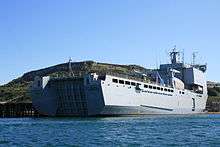
As a sealift ship, Largs Bay is capable of carrying up to 1,150 linear metres of vehicles; equivalent to 24 Challenger 2 tanks, 32 M1A1 Abrams tanks, or 150 light trucks.[1][4] The cargo capacity is equivalent of 200 tons of ammunition, or 24 twenty-foot equivalent unit containers.[1] During normal conditions, a Bay-class ship can carry 356 soldiers, but this can be almost doubled to 700 in overload conditions.[1] Helicopters are not routinely carried on board, but a temporary hangar may be fitted and the twin-spot flight deck is capable of handling helicopters up to the size of Chinooks, as well as Merlin helicopters and Osprey tiltrotor aircraft.[1][3][9] The well dock can carry one LCU Mark 10, one LCM-8, or two LCVPs (either the Royal Marines version or the Royal Australian Navy version), and two Mexeflotes can be suspended from the ship's flanks.[1][3][4] The LCM-1E landing craft being acquired by the RAN will not fit into the dock.[8] Two 30-ton cranes are fitted between the superstructure and the flight deck.[1]
Largs Bay and sister ship Lyme Bay were ordered from Swan Hunter on 18 December 2000.[1] Largs Bay was laid down at Swan Hunter's shipyard at Wallsend, Tyne and Wear on 28 January 2002; the first ship of the class work started on.[1] The ship was launched on 18 July 2003.[1] The ship was completed and accepted by the Ministry of Defence in April 2006, over a year late.[10] Largs Bay was dedicated on 28 November 2006, the second of the class to enter service with the RFA.[1] The Bay-class construction project saw major delays and cost overruns, particularly in the Swan Hunter half of the project.[10] Shortly after Largs Bay was handed over, Swan Hunter was stripped from the project, with BAE taking full responsibility for the class and Lyme Bay towed to BAE's shipyard in Govan for completion in June 2006.[10]
Operational history
United Kingdom
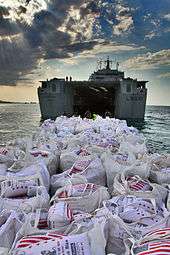
Four months after entering service, an engine room fire resulted in steering and propulsion issues, requiring Largs Bay to be towed to Plymouth for repairs.[11] In late November 2007, Largs Bay embarked 815 Naval Air Squadron 215 Flight and left home waters for the Caribbean to conduct counter-drug operations.[12] She visited eleven islands including Barbados, Curaçao, Grand Turk, Martinique, Trinidad and also the USA.[12] Three days after leaving Barbados Largs Bay's patrolling helicopter spotted a small fishing vessel stopped in the water and detained her after a pursuit; 575 kilograms (1,268 lb) of cocaine were recovered, with an estimated £20 million European street value.[12] She participated in Navy Days while in port at Curaçao, where several hundred people toured her.[12]
In late 2008, it was reported that Largs Bay was to replace HMS Northumberland for duties in the Falkland Islands. Northumberland was to have left for the Islands in December 2008, but was instead sent for pirate patrol off Somalia.[13]
In early 2010, Largs Bay was deployed to the Arctic Circle.[14] Following the 2010 Haiti earthquake, the ship was pulled from exercises and sailed on 3 February to deliver a load of relief supplies to Haiti.[14][15] On 18 February 2010, she arrived at Port-au-Prince and unloaded 430 tonnes (470 tons) of supplies plus 165 tonnes (182 tons) of rations, while engineers from the ship began work on restoring electricity ashore.[14][16] On 30 March 2010, she returned home.[17] Largs Bay's actions were recognised in December 2011 with the awarding of the Firmin Sword of Peace.[14]
In August 2010, the ship participated in the Bournemouth Air Festival.[18]
Decommissioning and transfer
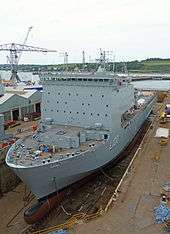
In December 2010, it was announced that the ship would be decommissioned in April 2011 as part of the Strategic Defence and Security Review.[19] Shortly after marking Largs Bay for disposal, the British Ministry of Defence contacted the Chilean government and suggested the vessel as a potential replacement for the landing ship tank vessel Valdivia, which was due to leave service.[21] In January 2011, the Australian Department of Defence announced that it was interested in purchasing the vessel for the RAN as a replacement for the heavy landing ship HMAS Tobruk or one of the Kanimbla-class amphibious warfare ships.[22] Interest in the ship was also shown by Brazil and India.[23]
On 17 March 2011, the Australian Department of Defence announced that the RAN would be bidding for Largs Bay; this was followed on 6 April by news that a £65 million (A$100 million) bid had been successful.[24][25] Sea trials during April showed that the ship was in good condition, although she would have to be modified before entering Australian service, particularly to allow operation in tropical conditions.[26] During a 16-week docking at the A&P Group shipyard in Falmouth, the modifications were made, along with refit work to maintain the ship's Lloyds certification.[6] The RAN also acquired two Mexeflote landing rafts for use with the ship.[27]
On 13 August, it was announced that Largs Bay would be renamed HMAS Choules when commissioned into the RAN.[28] The name comes from Chief Petty Officer Claude Choules, who served in both the Royal Navy and the RAN during his career, and was the last known living participant in World War I.[28][29] Choules is the second RAN vessel to be named after an enlisted sailor, following the submarine HMAS Sheean.[30] The ship was assigned the pennant number L100, reflecting the 100th anniversary of the RAN's origin in 2011.[29] Her motto is "Face Difficulty With Zeal".[31]
On 14 October, the vessel was handed over to the RAN.[32] She arrived in Fremantle, Western Australia on 10 December, and was commissioned into the RAN on 13 December.[33][34] Choules entered full operational service in early 2012, and is based at Fleet Base East.[27][31]
Australia
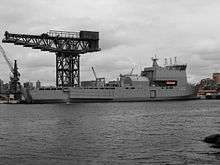
On 24 February 2012, Choules arrived in Townsville.[35] This was in preparation for a month of amphibious warfare training exercises with the Australian Army's 3rd Brigade.[35]
In June 2012, one of the two main electrical transformers involved in the ship's propulsion system failed, after an earlier engineers report highlighted "overheating of the propulsion motors and transformers".[11][36] Inspection found that insulation failure had short-circuited the transformer, while other transformers aboard showed premature wear.[36] Unable to find an available spare, a new unit had to be ordered from the manufacturer.[11] In June, it was predicted that Choules would be out of service for four to five months, but by October, claims were made that the ship would be inoperable until at least January 2013, and if all of the wear-showing transformers were replaced, she would not return to service until April 2013.[11][36] By December, the faulty transformer had been replaced, and the RAN had decided that although the other transformers (propulsion and others) had been shown to have acceptable levels of wear, all would be replaced before Choules was reactivated.[37] These repairs were completed in early 2013, and the ship was assessed as ready to re-enter service on 12 April.[38]
For a short time from July 2013, Choules was anchored offshore of the Manus Regional Processing Centre in Papua New Guinea to provide temporary accommodation for Department of Immigration and other personnel, due to a lack of accommodation at the Centre.[39] In April 2015, the ship transported 46 Vietnamese asylum seekers back to Vũng Tàu, after their vessel was intercepted at sea on 20 March by Australian border protection units and their claims were rejected after interviews at sea lasting less than 40 minutes.[40][41]
Choules' operational role was reevaluated after the Canberra-class landing helicopter dock ships entered service in 2016, but will likely be kept on to fill the role of the strategic sealift ship envisioned by the 2009 Defence white paper.[8][42]
In March 2017 Choules was sent to Queensland to support recovery after Cyclone Debbie.[43]
Choules was deployed to Vanuatu on 30 September 2017 to aid in the rescue of 11,000 people from a volcanic eruption of Monaro Voui.
In January 2020, Choules was deployed to the coastal town of Mallacoota in East Gippsland, Victoria, to evacuate thousands of people trapped by bushfires and to ferry them south to Hastings in Western Port Bay.[44][45][46]
Citations
- Saunders (ed.), Jane's Fighting Ships 2008–2009, p. 876
- Kemp, New UK landing ship takes to the water
- Scott, The Royal Navy's Future Fleet
- Royal Australian Navy, HMAS Choules
- Royal Navy, RFA Largs Bay
- Kerr, Amphibious ambitions
- Johnson, Ian (4 February 2010). "RFA Largs Bay Haiti Diary". Royal Navy. Archived from the original on 6 April 2010. Retrieved 12 July 2012.
- Gillett, Australia's Navy, Part 2, p. 22
- Scott, Sweating the asset: versatility is the key to LSD(A) multi-tasking
- Brown, UK strips Swan Hunter of LSD(A) role
- McPhedran, Missing spare part grounds Navy ship
- Royal Navy, 815 Naval Air Squadron in RFA Largs Bay
- UPI, Britain withdraws warship from Falklands
- Craig, Royal Fleet Auxiliary ship Largs Bay wins award
- BBC News, RFA Largs Bay leaves Southampton bound for Haiti
- Daily Express, Royal Navy aid ship reaches Haiti
- The News, RFA Largs Bay returns home after earthquake aid mission
- Bournemouth Echo, RFA Largs Bay sails in for Bournemouth Air Festival
- Defence News, Changes to Royal Navy's surface fleet announced
- Higueras, Chile eyes new amphibious transport ship
- Oakes, Navy eyes redundant UK vessel
- Kerr, Australia completes Largs Bay purchase
- Taylor, Australia to buy amphibious military transport ship, aircraft
- Australian Associated Press, Australia to buy used UK landing ship
- Flash Traffic: Purchase of Largs Bay, in The Navy
- Royal Australian Navy, HMAS Choules commissioned
- Moulton & Australian Associated Press, Naval ship named after WA war veteran Claude Choules
- Griggs, Naming of Ex RFA Largs Bay - HMAS Choules
- Royal Australian Navy, HMAS Sheean
- O'Callaghan, Choules on her way
- Dodd, Navy's borrowed ship costs us $82,000 a day
- Sea Waves, Port Visits December 2011
- Australian Broadcasting Corporation, HMAS Choules commissioned in honour of veteran
- Timms, Newest Navy warship heads north
- Australian Associated Press (17 October 2012). "Navy unclear why $100m ship broke down". smh.com.au (The Sydney Morning Herald). Retrieved 17 October 2012.
- "In Brief: Work on Choules". Navy News. Directorate of Defence News. 6 December 2012. pp. 6–7.
- West, Sarah. "HMAS Choules returns to sea". Royal Australian Navy. Retrieved 12 April 2013.
- Robert Cornall AO, Review into the events of 16-17 February 2014 at the Manus Regional Processing Centre, 23 May 2014
- Aston, Heath (17 April 2015). "Australian Navy to hand 50 asylum seekers back to Vietnam". The Canberra Times. Retrieved 28 May 2015.
- "Úc bị chỉ trích vì từ chối cho 46 thuyền nhân Việt Nam tị nạn". Nguoi Viet Daily News (in Vietnamese). 27 May 2015. Archived from the original on 28 May 2015. Retrieved 28 May 2015.
- Department of Defence, Defending Australia in the Asia Pacific Century, p. 73
- Andrew Greene (28 March 2017). "Navy's largest ships unable to join Cyclone Debbie emergency response amid engine troubles". Australian Broadcasting Corporation. Retrieved 28 March 2017.
- @LindaReynoldsWA (31 December 2019). "I've spoken with @ScottMorrisonMP & authorised #ADF to deploy extra assets to the Victorian fires: 3 helicopters & 1 aircraft will fly to East Sale; HMAS Choules & MV Sycamore will sail to East Gippsland. A Joint Task Force has been stood up with Army personnel & Liason Officers" (Tweet) – via Twitter.
- Donovan, Samantha (3 January 2020). "Thousands ferried out to HMAS Choules". ABC Radio. Retrieved 3 January 2020.
- "'Leave high risk areas now': Warning ahead of hot weekend". www.adelaidenow.com.au. 2 January 2020. Retrieved 2 January 2020.
References
- Books
- Department of Defence (2 May 2009). Defending Australia in the Asia Pacific Century: Force 2030. Commonwealth of Australia. ISBN 978-0-642-29702-0. OCLC 426475923.
- Saunders, Stephen (ed.) (2008). Jane's Fighting Ships 2008–2009. Jane's Fighting Ships (111th ed.). Surrey: Jane's Information Group. ISBN 978-0-7106-2845-9. OCLC 225431774.CS1 maint: extra text: authors list (link)
- Gillett, Ross (2012). Australia's Navy: Today and Tomorrow. Part 2. Topmill.
- Journal articles
- Brown, Nick (13 July 2006). "UK strips Swan Hunter of LSD(A) role". Jane's Defence Industry. Jane's Information Group.
- "Flash Traffic: Purchase of Largs Bay". The Navy. Navy League of Australia. 73 (3): 13. July 2011.
- Higueras, José (26 January 2011). "Chile eyes new amphibious transport ship". Jane's Defence Weekly.
- Kemp, Ian (25 July 2003). "New UK landing ship takes to the water". Jane's Defence Weekly. Jane's Information Group.
- Kerr, Julian (6 April 2011). "Australia completes Largs Bay purchase". Jane's Defence Weekly. Jane's Information Group.
- Kerr, Julian (22 December 2011). "Amphibious ambitions: expanding Australia's naval expectations". Jane's Navy International. Jane's Information Group.
- Scott, Richard (4 September 2003). "The Royal Navy's Future Fleet – Taking Shape". Jane's Defence Weekly. Jane's Information Group.
- Scott, Richard (3 August 2011). "Sweating the asset: versatility is the key to LSD(A) multi-tasking". International Defence Review. Jane's Information Group.
- 'Themistocles' (January 2011). "The UK SDSR and JP 2048 Phase 4C – A Golden Opportunity". The Navy. Navy League of Australia. 73 (1): 2–3.
- News articles
- Australian Associated Press (6 April 2011). "Australia to buy used UK landing ship". The Sydney Morning Herald (smh.com.au). Retrieved 7 April 2011.
- "HMAS Choules commissioned in honour of veteran". ABC News. Australian Broadcasting Corporation. 13 December 2011. Retrieved 13 December 2011.
- "RFA Largs Bay leaves Southampton bound for Haiti". BBC News. 3 February 2010. Retrieved 18 March 2011.
- Craig, Alastair (27 December 2011). "Royal Fleet Auxiliary ship Largs Bay wins award". JournalLive.co.uk. The Journal. Retrieved 6 January 2012.
- "Royal Navy aid ship reaches Haiti". Daily Express (express.co.uk). 18 February 2010. Retrieved 18 March 2011.
- Dodd, Mark (20 October 2011). "Navy's borrowed ship costs us $82,000 a day". The Australian. News Corp Australia. Retrieved 21 October 2011.
- McPhedran, Ian (25 June 2012). "Missing spare part grounds Navy ship". AdelaideNOW. Adelaide Advertiser. Retrieved 26 June 2012.
- "Changes to Royal Navy's surface fleet announced". Defence News. Ministry of Defence. 15 December 2010. Retrieved 18 March 2011.
- Moulton, Emily; Australian Associated Press (13 August 2011). "Naval ship named after WA war veteran Claude Choules". PerthNow. The Sunday Times. Retrieved 14 August 2011.
- O'Callaghan, James (24 November 2011). "Choules on her way". Navy News. Department of Defence. 54 (22): 3. Retrieved 23 November 2011.
- Oakes, Dan (21 January 2011). "Navy eyes redundant UK vessel". The Sydney Morning Herald. smh.com.au. Retrieved 23 January 2011.
- "815 Naval Air Squadron in RFA Largs Bay". 815 Naval Air Squadron. Royal Navy. Retrieved 16 April 2011.
- "HMAS Choules commissioned". News. Royal Australian Navy. Archived from the original on 30 August 2012. Retrieved 21 December 2013.
- Smith, Steven (18 August 2010). "RFA Largs Bay sails in for Bournemouth Air Festival". Bournemouth Echo. Retrieved 15 April 2011.
- Taylor, Rob (17 March 2011). "Australia to buy amphibious military transport ship, aircraft". Reuters. Retrieved 18 March 2011.
- Scammell, Ruth (30 March 2010). "RFA Largs Bay returns home after earthquake aid mission". The News (Portsmouth). Retrieved 18 March 2011.
- Timms, Penny (24 February 2012). "Newest Navy warship heads north". ABC News. Australian Broadcasting Corporation. Retrieved 24 February 2012.
- "Britain withdraws warship from Falklands". United Press International. 7 December 2008. Retrieved 18 March 2011.
- Websites
- Griggs, Ray (13 August 2011). "Naming of Ex RFA Largs Bay - HMAS Choules". Royal Australian Navy. Archived from the original on 6 December 2011. Retrieved 14 December 2011.
- "HMAS Choules". Royal Australian Navy. Retrieved 1 January 2013.
- "HMAS Sheean". Royal Australian Navy. Retrieved 1 January 2013.
- "RFA Largs Bay". Royal Navy. Archived from the original on 9 May 2006. Retrieved 6 January 2012.
- "Port Visits December 2011". Sea Waves. Archived from the original on 2 February 2013. Retrieved 15 May 2012.
External links
